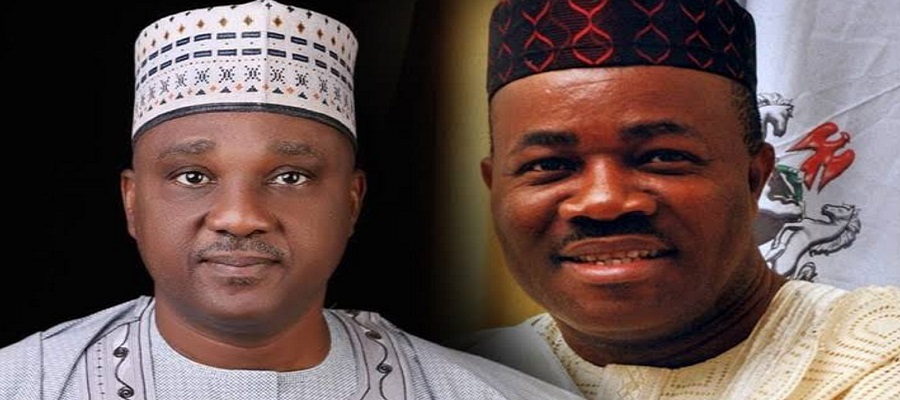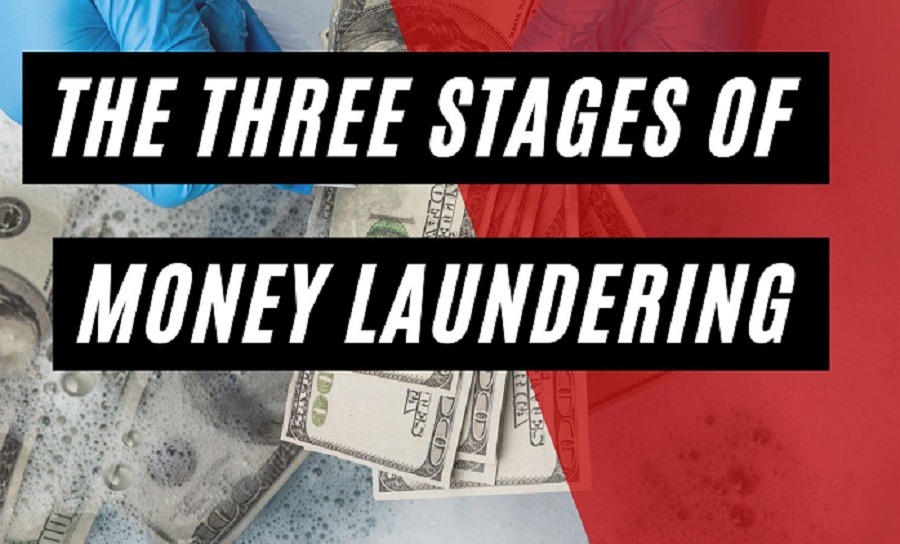General News
HSBC Fingers Garuba, Agom in $182m Halliburton Bribery Scandal

Leaked records from HSBC, a huge global bank based in London, has indicted chief of staff to former military Head of State, General Abdulsalami Abubakar, now retired Major General Chris Garuba, and a former board member of the ruling Peoples Democratic Party (PDP), the late Andrew Agom, in the $182 million Halliburton bribery scandal.
The leaked files, obtained by the French newspaper, Le Monde and the International Consortium of Investigative Journalists (ICIJ), revealed that Garuba, a former governor of Bauchi State, is now chairman of Obekpa Petroleum, a Nigerian oil company.
Agom, a senior government official, was killed in an attack on his motorcade years back. The files also revealed new details about the HSBC’s role as a conduit for the bribes and new details about how indicted British lawyer Jeffrey Tesler’s operated.
The indictment of the high-ranking Nigerians not previously named publicly in connection with the scandal, according to the French newspaper, raised the possibility of renewed questions about Nigeria’s handling of the affair.
A network of secretive banks and offshore tax havens was used to funnel $182 million in bribes to Nigerian officials in exchange for $6 billion in engineering and construction work for an international consortium of companies that included the then Halliburton subsidiary.
Before his death, Agom was a board member of the PDP, which controlled the government when the scandal unfolded.
In 2010, Nigeria indicted former United States Vice- President Dick Cheney, who was CEO of Halliburton before he was elected, only to later clear him when Halliburton worked out a $35 million settlement.
Agom was, according to the Le Monde, the beneficial owner of an HSBC account linked to a Gibraltar- based company, Hemisphere Services Limited, which held a maximum amount of $797,377 at one point between 2006 and 2007.
Africa Confidential magazine previously named a company, Hemisphere Services (Nigeria), as a “recipient of largesse” from Tesler after viewing documents disclosed to the magazine during a French corruption investigation.
Agom’s account was opened in 1991, on the same day that an account was opened in the name of former Nigerian Air Force Chief, Abdullahi Dominic Bello. A Nigerian government investigator has previously described Swiss accounts held by Bello as a conduit for “slush funds”. The investigator did not specifically mention HSBC.
The HSBC files identified Garuba and his wife, Rita, as HSBC clients; their names are listed along with Tesler’s in an account named Bridlington Enterprises Limited, for which Tesler acted as an attorney.
“The files show that the account was opened the year before Tesler sent his first bribe payment to Switzerland, although the files do not show that Tesler transferred money into the Bridlington account, which held as much as $367,547 in 2006 or 2007,” the newspaper reported. Chris and Rita Garuba did not respond to ICIJ’s requests for comment.
In Nigeria, anti-corruption campaigners continue to call on authorities to identify and prosecute Nigerian citizens involved in the scandal. While never publicly released, a 2010 Nigerian government document reportedly included three Nigerian presidents, a vice-president, a minister, intelligence chiefs and corporate titans in a list of bribery beneficiaries. The report did not name Garuba or Agom.
“In terms of the personalities and the amount of money involved it is probably the biggest scandal in Nigeria’s history,” Dauda Garuba, Nigeria coordinator at the Natural Resource Governance Institute, said in an interview with ICIJ. Garuba has no connection to the Garuba family in HSBC’s files.
“Although we’ve seen the indictment and conviction of foreign companies and their top executives in Europe and America, Nigeria’s own government has not taken action in the very country in which the corruption took place,” Garuba said.
Tesler was sentenced to 21 months in prison and he forfeited $149 million from his Swiss accounts to the US government for serving as the go-between for bribes paid to secure contracts for KBR, the former Halliburton subsidiary, and the other consortium members, the Japanese firm JGC Corporation, Paris-based Technip, as well as Italy’s ENI S.p.A. and its Dutch subsidiary Snamprogetti Netherlands B.V.
The Halliburton Bribery Scandal dates to 1994 when the Nigerian government launched ambitious plans to build the Bonny Island Natural Liquefied Gas Project. Tesler began planning the bribe payments in 1994 and transferred small amounts of money through Switzerland in July 1996.
But by 2003, his role had escalated. In one brazen episode in Abuja, Tesler directed the drop-off of a travel bag stuffed with $1million in $100 bills in the foyer of a luxury hotel where the pernight cost of a suite can exceed the nation’s average annual income of $3,000. It was one of at least 20 money transfers that Tesler made or directed.
The cash was destined for PDP via the Nigerian National Petroleum Corporation (NNPC), according to an official Nigerian report.
The files obtained by Le Monde and ICIJ show that nine people, including members of the Tesler family and Nigerian nationals, held a variety of roles with accounts at HSBC Private Bank (Suisse) between 1990 and 2003 — months before the completion of the gas plant.
Nine of the 12 accounts instructed HSBC to keep all correspondence under lock and key in a bank safe. In response to ICIJ’s questions, an HSBC spokesman said the bank does not comment on specific clients.
Bank staff also responded to a request from Agom’s widow to unfreeze her husband’s account, whose post was sent to Tesler’s North London law firm and which was marked as subject to criminal investigations into Tesler.
The files do not indicate whether or not the account was ultimately unfrozen.
Tesler did not respond to ICIJ’s requests for comment.
General News
SERAP Asks National Assembly to Drop Bill to Jail Nigerians who Fail to Vote

Socio-Economic Rights and Accountability Project (SERAP) has urged Godswill Akpabio, Senate president, and Tajudeen Abbas, speaker of the House of Representatives, “to immediately withdraw the oppressive bill which contains repressive provisions to jail any Nigerian of voting age for six months and/or impose a fine of N100,000 on them if they fail to vote in national and state elections.”

SERAP urged Akpabio and Abbas to instead “amend the Nigerian Constitution 1999 [as amended] and the Electoral Act 2022 to remove constitutional immunity for state governors and their deputies who commit electoral offences, including vote-buying, to facilitate the investigation and prosecution of perpetrators.”
SERAP also urged Akpabio and Abbas “to amend the Nigerian Constitution and the Electoral Act to explicitly prohibit the appointment of members of any political party as resident electoral commissioners (RECs) of the Independent National Electoral Commission (INEC).”
There is currently in the National Assembly a ‘Bill for an Act to Amend the Electoral Act 2022 to Make It Mandatory for All Nigerians of Majority Age to Vote in All National and State Elections and for Related Matters.’ The bill seeks to make voting compulsory and prescribes a six-month jail term or a fine of N100,000 or both for non-compliance.
In the letter signed by Kolawole Oluwadare, deputy director, SERAP at the weekend, the organisation said: “Jailing eligible Nigerians for deciding not to vote would be entirely inconsistent and incompatible with the letter and spirit of the Nigerian Constitution and the country’s international human rights obligations.”
SERAP said, “Rather than proposing bills that would severely punish Nigerians who may decide not to exercise their right to vote, the National Assembly ought to propose bills to remove constitutional immunity for governors and their deputies who commit electoral offences and undermine the integrity of the electoral process.”
According to SERAP, “The most effective way to solve the perennial voter apathy is to create a safe and conducive environment, combat the impunity of high-ranking politicians who commit electoral offences, and generally improve the electoral process to encourage the citizens to come out to vote, and not to send them to jail.”
The letter, read in part: “Should the National Assembly fails to drop the bill prescribing a six-month jail term for eligible Nigerians who decide not to vote in national and state elections, and should any such bill be assented to by President Bola Tinubu, SERAP would consider appropriate legal action to challenge the legality of any such law and ensure they are never implemented.”
“The idea of compulsory voting and jailing citizens for not voting is impracticable, unnecessary and unlawful. The right to vote is part of citizens’ right to participate in their own government and the choice of whether to exercise it is personal.”
“The right to vote includes the right not to vote. If the right to participation is a right of the citizen, she/he must be free to decide whether or not to exercise it.”
“Because the notion of a democracy exists by virtue of the consent of the citizens, voters must get to choose how they exercise consent, not be forced to the polls like ‘cattle to the slaughter.’”
“The National Assembly ought to propose bills to reduce the influence of money in politics, and encourage and not compel the exercise of the right to participation.”
“The proposed bill is a blatant violation of the right to political participation, which is guaranteed under section 14(1)(c) of the Nigerian Constitution, article 25 of the International Covenant on Civil and Political Rights and article 13 of the African Charter on Human and Peoples’ Rights to which Nigeria is a state party.”
“SERAP also urges you to amend the Nigerian Constitution and the Electoral Act to include explicit mandatory provisions on internet voter registration, and the use of modern technology, including in casting and counting, voter registration and systems for reporting results.”
“Amending the Nigerian Constitution and the Electoral Act to explicitly include the right of eligible Nigerians to vote and to vote securely would enhance the effective enjoyment of their right political participation and representative democracy.”
“It would rebuild public confidence in the ability of the National Assembly to effectively perform its constitutional responsibilities.”
“Any amendment of the Nigerian Constitution and the Electoral Act must include bills to address and punish governors and their deputies and their agents who commit electoral offences including voter suppression, voter intimidation and the destruction of polling units or theft of election materials.”
“It is important for the National Assembly to introduce and pass bills that would effectively rein politicians who continue to abuse the electoral rules to distort and undermine the right to participation with almost absolute impunity.”
“Removing constitutional immunity for governors and their deputies who commit electoral offences would address the brazen impunity for electoral and human rights crimes which frequently characterise the country’s elections.”
“The major problem facing the country’s democracy is the lack of respect for Nigerians’ right to participation and the concomitant lack of trust in election results. If citizens do not believe in the election process, then the entire system of democratic government becomes a questionable enterprise.”
“The crisis confronting Nigerian elections and lack of public trust and confidence in the electoral process can be addressed if the right of Nigerians to vote and to vote securely is explicitly recognized in the constitution as justiciable right.”
“Nigerians do not currently enjoy explicit right to vote and to vote securely. Although the Nigerian Constitution 1999 [as amended] provides in Section 14(1)(c) that, “the participation by the people in their government shall be ensured in accordance with the provisions of this Constitution”, this is not recognized as legally enforceable human right.”
“Nigerian election laws ought to be such that would give effect to the electorate’s will and uphold the popular mandate through clean, fair, and honest elections. The right to vote in a democracy is important because so many other matters depend upon its exercise.”
General News
FG to Elevate Enugu Tech Festival to National Event – Minister

Dr. Bosun Tijani, minister of Communication, Innovation, and Digital Economy, has annunced plans to elevate Enugu Tech Festival (ETF), to a national event.

Enugu Tech Festival is scheduled for May this year,
The minister during a working visit to Enugu State, disclosed plans to personally attend the festival and ensure its expansion to attract tech professionals from across the country.
The Enugu Tech Festival would help to strengthen the ongoing collaboration between the state and the federal government in advancing technological innovation, digital infrastructure, and entrepreneurship in the southeast region.
Commending the leadership of Governor Peter Mbah, Tijani praised his vision for fostering innovation and technological development in Enugu.
He lauded the governor’s achievements in critical sectors such as infrastructure, education, and industry, highlighting how the advancements lay the foundation for a vibrant digital economy that will empower the state’s youth.
The minister outlined a series of groundbreaking initiatives aimed at further transforming Enugu’s technological landscape.
One of the most significant announcements was the launch of the Project 774 Connectivity Initiative, a project designed to bring internet access to all 17 local government secretariats across the state.
Powered by Galaxy Backbone and NIGCOMSAT, the initiative will ensure seamless connectivity for government offices and the public, facilitating efficient governance and service delivery.
The collaboration between Galaxy Backbone and Enugu State will lead to the establishment of a Digital Innovation Complex.
The complex will serve as a hub for technological growth, digital innovation, training, and entrepreneurial support.
It will also connect over 200 state-owned institutions, including schools, healthcare centers, and government offices, to reliable internet services, further enhancing the state’s digital infrastructure.
Tijani announced the federal government’s plan to extend internet access to underserved areas in the state through the Universal Service Provision Fund (USPF).
“This effort will include the installation of a new base station and the laying of 15 kilometers of fiber optic cable to provide high-speed internet.
“As part of this initiative, computer laboratories will be set up in one secondary school and one tertiary institution in Enugu,” he said.
He also announced plans to establish an Artificial Intelligence (AI) Regional Centre at the University of Nigeria, Nsukka.
“This centre will become a focal point for AI research and development in the South East, offering state-of-the-art facilities to foster innovation in artificial intelligence”, he added.
“As part of this initiative, we plan to train 100 cybersecurity professionals in Enugu, boosting the state’s cybersecurity capabilities as part of a nationwide effort.
“The Digital Literacy for All (DL4ALL) initiative, will train 1.155 million Enugu residents in essential digital skills by 2027.
“This program will prioritise underserved groups, including artisans, market women, civil servants, and students, ensuring that everyone has the opportunity to engage with the digital economy,” he said.
The minister also expressed satisfaction with the success of the 3MTT Programme in Enugu, which has already received over 14,000 applications, adding that the program aims to empower the youth by equipping them with the skills necessary to thrive in the digital economy, to train over 150,000 fellows in the state.
Other key projects unveiled included the establishment of a Tier III Data Centre, a Co-working Space for tech entrepreneurs and SMEs, and an Incubation Hub to support innovation and provide mentorship and funding to tech startups.
General News
NCS to Launch Electronic System for Cash Declarations at Airports

Nigeria Customs Service (NCS) is set to introduce an electronic declaration system to streamline and enhance compliance for travelers carrying cash into or out of Nigeria.

Speaking in an interview with the News Agency of Nigeria (NAN) in Abuja, Abdullahi Maiwada, NCS spokesperson, emphasized that the initiative aligns with efforts to strengthen Nigeria’s anti-money laundering framework and reinforce financial regulations.
“The Nigeria Customs Service (NCS) has announced the deployment of an Electronic-Currency (E-Currency) declaration form as part of its anti-money laundering measures for travelers carrying cash into and out of Nigeria,” NAN reported. The system will require travelers carrying amounts exceeding the legal threshold to declare them before arrival or departure.
Maiwada further explained the process, stating, “We have developed a system where, even before leaving your point of origin, you can scan a QR code, access the form, fill it out, and we will be able to see it from here.”
He noted that the initiative, set for rollout soon, will enhance monitoring and facilitate information sharing with relevant authorities.
Under the Anti-Money Laundering (Prevention and Prohibition) Act 2022 and the NCS Act 2023, travelers carrying over $10,000 (about N15.4 million) or its equivalent in negotiable instruments must declare the funds to Customs authorities.
To boost awareness, the NCS is working with airline operators to inform travelers through onboard announcements and plans to reinstate signage at airports and border points in English and French.
The move comes as part of broader efforts to tighten financial controls following a recent case at the Murtala Muhammed International Airport (MMIA), where Customs officials seized $578,000 from a passenger attempting to evade currency declaration regulations.

 Telecom2 days ago
Telecom2 days agoIHS Nigeria Hosts Telecom Industry Stakeholders to Discuss Protection of Critical National Infrastructure in Lagos State

 E-Financial2 days ago
E-Financial2 days agoTitan Trust Bank Selects Oracle FSS for Core and Digital Banking Technology

 General News2 days ago
General News2 days agoNCS to Launch Electronic System for Cash Declarations at Airports

 News2 days ago
News2 days agoSanwo-Olu Hails Jumia for Giant Strides in Growing Nigeria’s E-Commerce Sector

 E-Financial2 days ago
E-Financial2 days agoIMF Appoints Elumelu, Nigerian Businessman to Advisory Council

 Telecom2 days ago
Telecom2 days agoMTN Champs Continental Relays: Over 1,000 Athletes Gear Up for Lagos Showcase

 General News2 days ago
General News2 days agoAquaterra Energy Secures Multi-million-dollar well Intervention Contract with Intrepid Energy in Nigeria

 Telecom11 hours ago
Telecom11 hours agoSmart Treasure Investment Team’s Initiatives Eradicate Poverty, Says Aminu



























